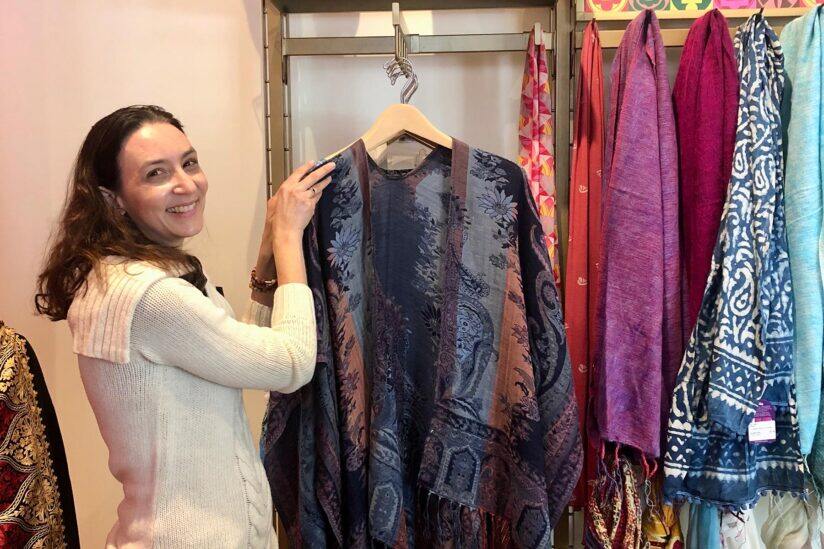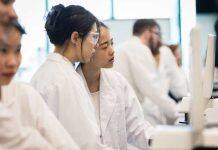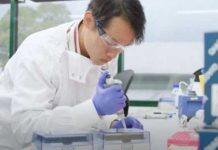

The USC Pacific Asia Museum shop in Pasadena is betting that gift givers want to give more than just a present.
That’s why 60% of the merchandise at the museum is certified as fair trade – sourced from Asian American and Asian artists, as well as L.A. area artists, says Michelle Bourdon, the store manager at the museum.
Some of the proceeds from their crafts – from books, blankets and jewelry to pottery and musical instruments — support broader missions such as helping women or other artists around the world to rise from poverty or receive training or go to school.


Some of the proceeds from the museum’s free trade merchandise support broader missions such as helping women or other artists around the world to rise from poverty or receive training or go to school. (Photos/Courtesy of the USC Pacific Asia Museum)
The corner of the museum shop features a display of cottony blankets in brilliant reds, blues and greens.
“These quilts are made of recycled saris from India. This particular collection is from a group that works with the women who have lived in the slums of Calcutta, some of whom have possibly worked in the sex trade,” says Bourdon. “The women may learn marketing skills. They learn to sew. The organizations that work with them have given these women a new career.”
USC Pacific Asia Museum store manager inspired to sell fair trade items
Bourdon, who has managed the USC PAM shop for three years, was inspired to sell crafts from fair trade artists 10 years ago when she attended an exhibition at the Skirball Cultural Center called “Women Hold up Half the Sky.”
The exhibition name resembled a proclamation issued by former China President Mao Zedong that paved the way for more Chinese women to work outside of the home.
At the time of the event, then-New York Times writers Nikolas Kristof and Sheryl WuDunn were promoting the mission to help women worldwide rise through a book that they co-authored, Half the Sky: Turning Oppression into Opportunity for Women Worldwide, which also echoed for the former China president’s dictum.
“WHETHER IT IS IN OUR GALLERIES OR IN OUR STORE, OUR GOAL IS TO EMPOWER ARTISANS.”
– BETHANY MONTAGANO
– USC PACIFIC ASIA MUSEUM DIRECTOR
“Whether it is in our galleries or in our store, our goal is to empower artisans,” says Bethany Montagano, director of the USC Pacific Asia Museum. “I am so proud of Michelle’s vision to place Fair Trade at the forefront of museum store. It provides a literal means for the producers of this work to develop their independence and in some cases their freedom from exploitation and trafficking.”
Bourdon notes that selling items from fair-trade artists provides benefits that exceed obvious economic support. “There also is a sustainability aspect to it,” she says. “The women who make the sari blankets, for example, learn to save fabrics so that they don’t end up in a landfill.”
More museums, like USC Pacific Asia Museum, selling fair trade gifts
Bourdon says that the USC Pacific Asia Museum shop is one of several museum stores increasingly sourcing gifts in their shops. The fair-trade certification of global artists is the job of Fairtrade America, an organization that inspects workplaces worldwide to ensure they fulfill best practices for equitable pay, provide safe working conditions, training and educational opportunities while fostering sustainable practices.
The organization touts that it has certified more than 2 million artists worldwide. The certification carries great weight: museum store managers look for the certification when deciding which wares to sell.
In one corner of the store, Bourdon points to an array of scarves – some wool, some silk and others with a unique mix of sheer white fabric with felt shapes that resemble peacock feathers in green, yellow and blue hand-pressed and melded into the fabric.
“I have gotten these pieces from Nepal,” Bourdon says, fanning the scarves with a lift of her arm. “The women rub and press the felt shapes into the fabric.”
Locally, Bourdon hunts for artists who also have a mission.
“There’s a local artist, too, Angela Zhu, who has taken her grandfather’s calligraphy and added her own spin to it, digitally printing them onto silk handkerchiefs,” Bourdon says. “She donates her proceeds to an orphanage. So even our local artists are giving back and finding ways to help the community.”
The USC Pacific Asia Museum store is open Wednesday-Sunday, 11 a.m.-5 p.m. It will be closed on Christmas Day and New Year’s Day.







































